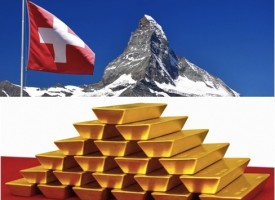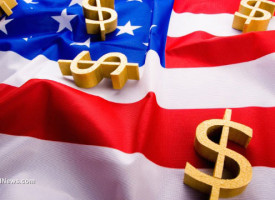Today a legend who was recently asked by the Chinese government to give a speech to government officials in China sent King World News a powerful piece that warns the elite now have the world headed for disaster.
By John Ing of Maison Placements
April 24 (King World News) – The United States needs a wake-up call and the loss of leadership and credibility on economic issues is exacerbated by the dysfunction and divisive nature on Capital Hill. Also, no longer is the US a reliable partner internationally (redlines are blurred). Respect, compromise or reasoning have been lost in the ideological battles as the priority of politicians seems more ideological than issues driven today.
World's Financial Elite Ignoring Thousands Of Years Of History
The world’s financial elite ignore thousands of years of history that proves money printing never works, and everyone celebrates every round of quantitative easing with new market highs. The era of quantitative easing has spawned an extraordinary financial bubble that shares the same characteristics as the housing bubble whose origins began with the same central banks determined to give everyone a house. This bubble, like others will end badly.
Despite signs of growth, the Fed seems to be keeping yields at less than one percent and the divide between American and European rates is at the widest since the seventies. Germany’s bunds currently yield 0.10 percent, and only Greece has a higher yield than the US. Risk has been mispriced as money flooded into the dollar. No longer is there a risk premium for moral hazard. Meantime, the over-indebted global economy is stuck in neutral despite the unprecedented financial engineering by central banks that created a huge global asset bubble.
The resulting currency war already claimed its first casualty when the Swiss removed their currency cap in January. We believe this disconnect between rates and the economy is the product of the central bank’s ironclad control of the economy. Furthermore, the Fed has yet to exit from its unconventional monetary policy which included an era of cheap and abundant dollar liquidity through trillions of bond purchases after more than six years of near-zero interest rates. This cannot last, and because of the mounting deficits of the last few years, America’s net debt has exploded to 100 percent of GDP.
Central Banks Are The New Oligarchs
That increase in the federal debt was financed three ways: borrowings from foreigners, borrowings from America’s taxpayers and third, the printing of money. For a time, foreign central banks were taking down an extreme share of US Treasuries as the appetite among the income starved private sector waned. So far, foreigners have financed over $6 trillion of America’s debt, led by Japan and China, who have warned Americans that they have enough dollars. And domestically? Because America simply did not enough savings to finance Treasury purchases, the Fed printed money under a made-in-US quantitative easing policy.
Government still spent, but on a permanent basis with no distinction between monetary and fiscal policies. The Fed funded these debt purchases by inflating reserves and money supply by some $4 trillion, money that had not previously existed. And seduced by zero interest rates, the overflow has gone into real estate, surging stock prices, classic cars and vintage watches. The giant cash hoards also financed mammoth share buybacks and mega-mergers. Simply there was too much money and too few opportunities. Booming stock prices should have sparked an investment boom. But it has not, in part due to the debasement of currency.
Money is no longer money. And, most problematic is that we are likely to see a QE 4, since the other three QE programs have proven to be unsuccessful. This Ponzi scheme is the new norm in printing money. A virtuous circle of currency devaluations is about to be tested in the real world as the strong dollar hurts America’s multinationals and exporters giving the Fed another reason to delay monetary tightening and keep the casino open.
In fact, money has been so debased it has little value and thus the rush to buy hard assets. Lenders are actually paying for the privilege to extend cash to governments, not the reverse. The new oligarchs are the central banks, led by the Federal Reserve who appears sanguine about the risks of a “beggar thy neighbour” currency war.
Cash Is No Longer King
Central banks have become part of the problem. At one time cash was king. Today there is no benefit for holding cash. Central banks have been acting like deaf prophets, so convinced of their own truths and doctrine that they don’t need to listen. They even ignore history, a history that shows money printing debases currencies which is ultimately inflationary. Central banks have become creators, not stewards of our money. That former custodian of hard currency, Switzerland is the first government in history to sell benchmark ten year at a negative interest rate.
Today over fifty percent of all global government bonds yield one percent or less and twenty- five percent of the Eurozone’s members have negative yields with four actually charging investors for the privilege of owning them. In Denmark, banks are paying customers not to save but to borrow. How ludicrous. Central banks have changed the cardinal rule of finance by rebranding bonds. Bonds are no longer obligations to be held and paid back at par but have become yet another speculative asset class like commodities. The world is upside down. In this world of negative capital, gold has resurfaced. It is the alternative – a store of value in a topsy- turvy world.
What The World Looks Like
The Bank for International Settlements (BIS) estimates that emerging markets rose almost five percent in the past five years despite struggling against the stronger dollar and weak commodity prices. And now with the “race to the bottom” currency war, there is increasing pressure on those governments with large current account deficits and of course, their respective currencies. One third of Turkey’s government debt is denominated in dollars.
Countries such as Brazil and South Africa took advantage of the low cost dollar financings to finance their external debts. Brazil’s GDP fell in the first quarter and the Brazilian real has lost more than a fifth of value against the US dollar since yearend. Not surprisingly this problem is the unintended consequence of the trillions of dollars created by the United States.
Those dollars became involved in the world’s largest carry trade and are now returning back to the United States. Herein lies the fodder for higher inflation and higher interest rates. Worrisome is when interest rates in the United States eventually rise, the fault lines in the international monetary system will have been exposed by the sharp divergence in monetary policy between the west and the east.
The evolution of the dollar’s role in the international monetary system has ebbed, While America has flooded the world with dollars, capital has become too abundant. The dollar, is no longer worth a dollar. That puts pressure on those countries that borrowed dollars and in turn those countries are looking for alternatives. Money has also left those economies and the exodus of capital is a problem. Worrisome is that this exodus of capital has outpaced the housing 2009 crisis.
China too has experienced an outflow of almost $100 billion in the final quarter of last year. Part of that outflow has flooded into Hong Kong via the Shanghai-Hong Kong Stock Connect created to give mainland investors access to the Hong Kong Stock Exchange such that the HKEx has become the largest exchange in the world.
No Need for Bretton Woods
Yet China did not have to introduce a QE program like the US. China in turn has set about internationalizing the renminbi and as part of China’s answer to the World Bank, established the Asian Infrastructure Investment Bank (AIIB) with an initial capital raise of $50 billion and fifty-seven founding members. The bank will finance roads, railways and infrastructure projects and complements the newly formed “BRIC” development bank set up in Shanghai. European countries including Germany and Italy jumped on board much to the consternation of the United States.
China’s goals are twofold. By establishing institutions that use the renminbi, it further internationalizes the renminbi while at the same time, lessens the influence of the dollar denominated Western global financial institutions. The establishment of AIIB and other institutions by China is a way to tilt US hegemony towards a more balanced prospective giving the East influence in global institutions.
For almost three quarters of a century, the world has been dominated by the fiat monetary system set up under the Bretton Woods Agreement. The International Monetary Fund (IMF) and the World Bank were established after Bretton Woods which gave the US dollar a preeminent position at the expense of gold in the international financial system. And today in a feeble attempt to be more inclusive, the IMF proposes new quotas but still too small and disproportionate for the dollars involved.
Meantime, foreign exchange reserves have increased six-fold to $12 trillion overshadowing the $4 trillion fixed income market. The convergence of the geo-economics and geo-political is a natural evolution of the global financial ecosystem but a bigger role is expected for China which of course would include, gold.
Gold Being Repatriated In Europe
Gold is being repatriated in Europe and the central banks of the East, namely Russia and China are buying gold as an alternative to the dollar. China is the largest producer in the world at 460 tonnes and consumer at an estimated 1,200 tonnes. We believe China has accumulated gold as part of the internationalization of the renminbi, adding to its reserves of 1,054 tonnes last reported in 2009. That amount is less than 2 percent of foreign exchange reserves, pale in comparison to the average holdings of 10 percent held by other major countries.
Gold has made a bottom, having tested the $1,150 support level four times in part due to the currency war that has seen gold easily outperform every currency but the US dollar. We believe growing investor nervousness about the waves of money printing that has devalued sovereign currencies will prove to be the main driver that will carry gold to all-time highs. Meantime, the total supply of gold grows slowly as producer costs increase. Since central banks can create new money by just a click of the mouse, the debasement of paper money will prove to be the main driver to push gold beyond $2,000 this year.
Gold To Perform Well During Perfect Global Storm
Gold is an alternative to the dollar. For that reason, nineteen central banks purchased gold last year on the open market, and countries such as Portugal, have used their bullion as collateral to reduce debt service cost. We expect gold to do well under this perfect storm of negative interest rates, complacent bond buyers and uber easy central bank policies. Gold is a hedge against the chance that the world’s central banks will prove no better at preventing another financial collapse than they were in fueling the global asset boom.
The conventional view is that normal growth will reassert itself. Our view is pessimistic. We have created debt upon debt. The global economy is now weaker and more leveraged than it was. We believe that the bottoming of gold is telling us the truth. The dollar will fall. Today no government stands for sound money. No candidate is calling for a return to sound money principles, other than Rand Paul. No central bank (other than Switzerland) is prepared to face up to markets and make the tough disciplined choice. Eighteen months from now, Americans will re-elect another inflationary president. That too will be good for gold. ***ALSO RELEASED: Man Who Predicted Collapse Of Euro Against Swiss Franc Warns World In For Another Major Surprise CLICK HERE.
© 2015 by King World News®. All Rights Reserved. This material may not be published, broadcast, rewritten, or redistributed. However, linking directly to the blog page is permitted and encouraged.
The audio interviews with Gerald Celente, Egon von Greyerz, Dr. Paul Craig Roberts, Andrew Maguire, James Turk, Rick Rule, Bill Fleckenstein, Dr. Philippa Malmgren, Eric Sprott, Robert Arnott, Michael Pento, David Stockman, Marc Faber, Felix Zulauf, John Mauldin, John Embry and Rick Santelli are available now. Other recent KWN interviews include Jim Grant — to listen CLICK HERE.







